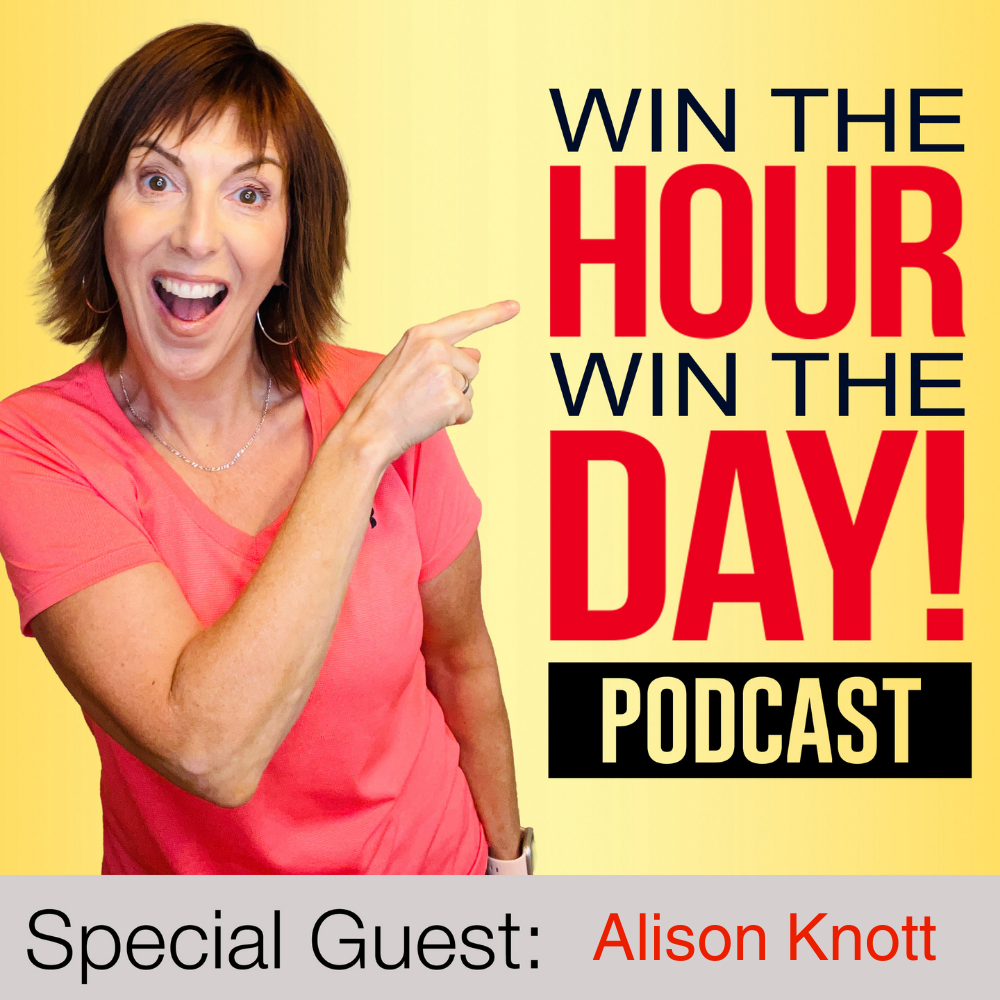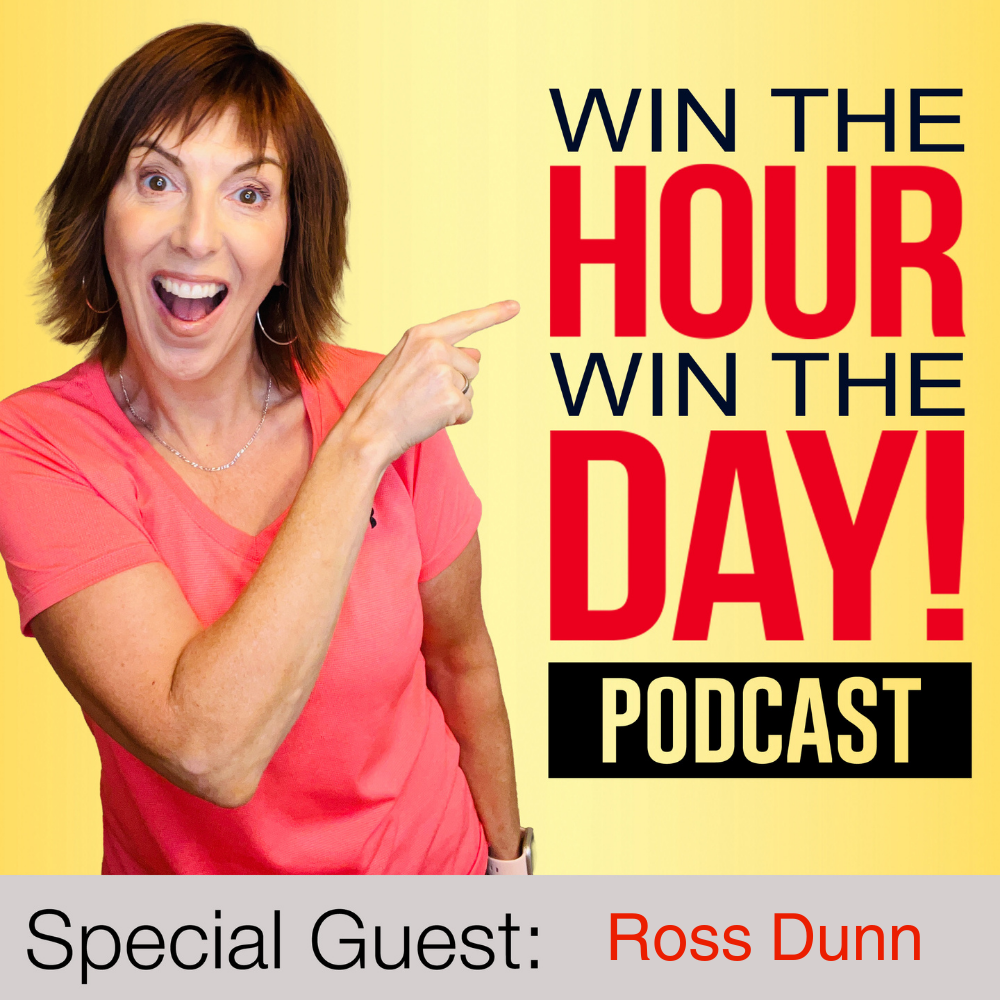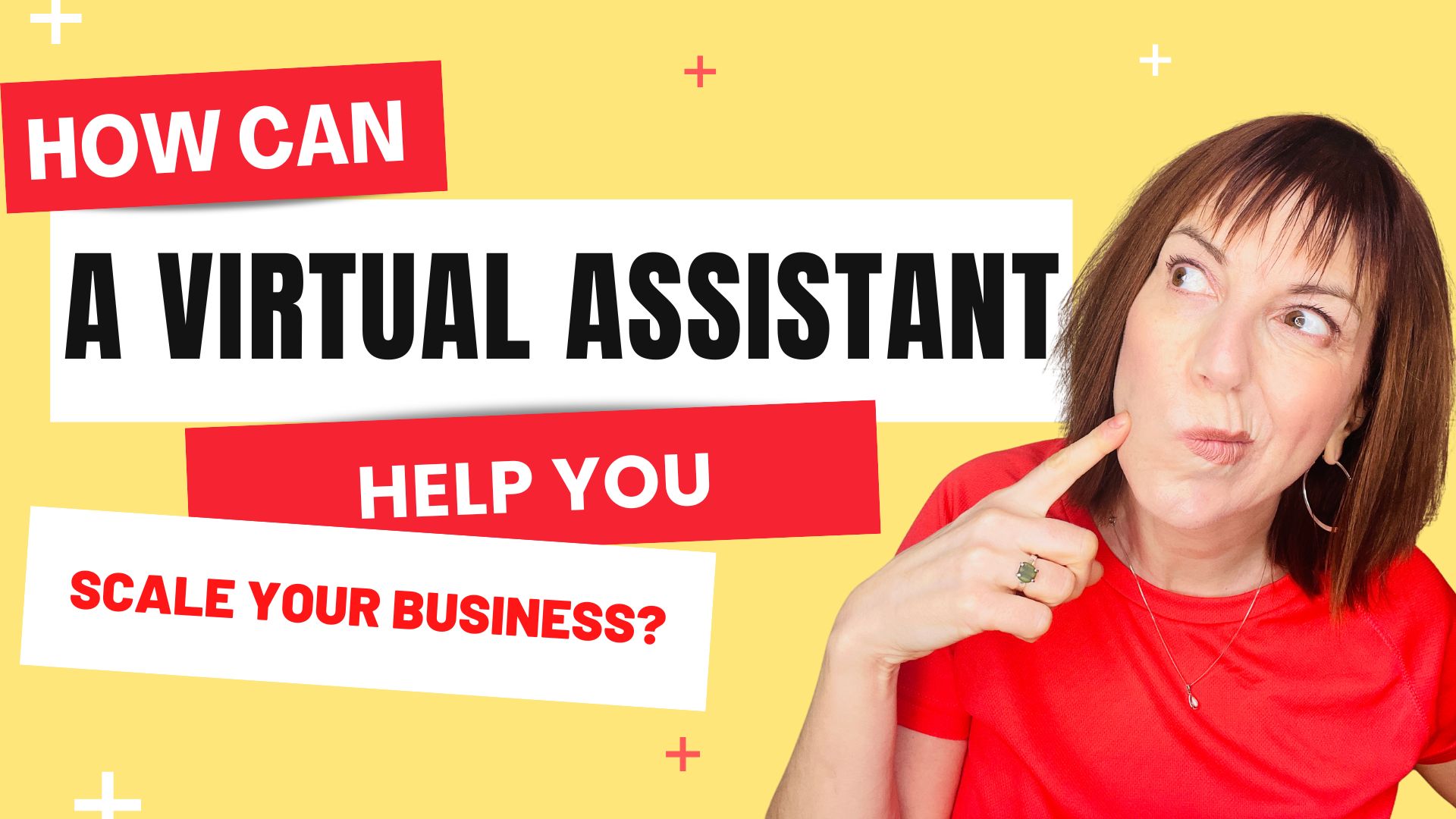Episode Summary
This week’s episode of Win The Hour, Win The Day Podcast interviews, Dina Behrman.
Tune in as I team up with Dina Behrman to explore the power of PR for your business!
In this engaging episode, you’ll discover:
-Why PR is essential for every entrepreneur, big or small.
-Common mistakes business owners make with PR.
-How to pitch your story effectively to media outlets.
A must-listen for every entrepreneur!
Don’t miss out on these invaluable insights.
Power Personality Quiz
http://winbacktimequiz.com/
Win The Hour, Win The Day! www.winthehourwintheday.com
Podcast: Win The Hour, Win The Day Podcast
Facebook: https://www.facebook.com/winthehourwintheday/
LinkedIn: https://www.linkedin.com/company/win-the-hour-win-the-day-podcast
You can find Dina Behrman at:
Website: https://dinabehrman.com/
LinkedIn: https://www.linkedin.com/in/dinabehrman/
Facebook: https://www.facebook.com/dina.behrman
Instagram: https://www.instagram.com/dinabehrman/
Win The Hour Win The Day
https://winthehourwintheday.com
Dina Behrman Podcast Transcription
[00:00:00] Kris Ward: Hey everyone. Welcome to another episode of Win The Hour Win The Day, and I am your host, Kris Ward. And today in the house we have Dina Behrman and Dina is a PR strategist and she is going to enlighten us from a whole different perspective. We had a little bit of a chat and I’m really eager to dive in because I think it’s really going to awaken our audience about the endless potentials here. Welcome to the show, Dina.
[00:00:23] Dina Berhman: Thank you so much for having me. Very excited to be here.
[00:00:27] Kris Ward: Okay, so let’s start with the basics. The basics being what do you think is the biggest misunderstanding about PR? Coming from the perspective of the entrepreneur, what is it you see right away from out of the gate that we’re not getting most of the time?
[00:00:42] Dina Berhman: I think there’s two things. I think one of the biggest things is that a lot of entrepreneurs actually don’t even consider PR as being something for them because they see it as something that is for bigger companies and people that maybe have like really large followings and are already really well known.
[00:00:58] So I think a lot of entrepreneurs actually overlook the concept of using PR in their business to publicize their business in the first place. So that would be the first mistake is that PR truly works for any entrepreneur. And you don’t have to have a really huge following. You don’t have to already be well known to be able to really benefit from PR.
[00:01:21] And then the second thing that I see.
[00:01:23] Kris Ward: Okay. Let me jump in here. I just want to unpack that for a second. Cause I think you are so right. I love talking about PR, but I feel like I’m starting to feel like somebody in relapse and recovery here. Because every time I talk to someone about PR, like yourself, I think, Oh, you’re right.
[00:01:38] Okay. I got to make that part of my weekly discipline. I got to do this. I got to do that. I have heard so many stories and I think the element of these stories and they come off like folklore, a little bit like winning the lottery. But you do hear people all the time that, you know what, they just chimed into something like whatever, maybe after the lockdowns and stuff, I could be chiming in about talking about working virtually right now.
[00:02:01] At the time I didn’t see that cause I’m thinking, no, I deal with entrepreneurs, not the workplace, but I could have been the expert. Being spoken to about that because I was doing it, long before this happened, which was hilarious. Cause then people would tell me when this broke the news, Hey, have you heard of zoom?
[00:02:15] I’m like, yeah, thanks. But anyhow, so I didn’t get it. And then whenever somebody on here, like yourself, I think, oh yeah, you’re right. I have things I could talk about, but it then you step back and you think, Oh, wait now, hold on. I’m, I’m not the biggest expert in this, or I don’t have it had the spotlight on me in that capacity.
[00:02:33] And yet there’s people with much less experience and all of a sudden they become the voice of something. But when we see them in an article on TV, wherever you see that PR element shining, what happens is you then associate them as the expert going, Oh, they must have known all like they are the expert and that interview is because they’re the expert, but they’re positioning themselves to be, in that spotlight.
[00:02:58] And I keep forgetting that. Like when you say this, it all sounds wise. And then I forget. So I think your point there is extremely valid. And we have to remember that we do have opinions, expertise, and thoughts that would be worthy of a discussion for someone to covering that topic.
[00:03:15] Dina Berhman: Yeah. And what you say is so true. And I think that sometimes people think that the journalist has gone to these people and asked them to come and comment. And it’s no, they pitched themselves for the article. Now, the thing is, once you start pitching yourself and putting yourself out there, absolutely, the journalist will come to you.
[00:03:33] But all of these people haven’t just magically had journalists come to them.
[00:03:41] And that’s how they’ve ended up doing it and that is truly available to everyone.
[00:03:45] Kris Ward: You are so right. And you said it far more eloquently than me. I gave you a five minute story and you’re like, yeah, instead of you’re doing the pitching instead of getting pitched to. And I’m totally comfortable with that being on a whole bunch of podcasts or things like that, but somehow it seems like the written word is more mighty and, we revere authors like, Oh my gosh, they’re in this, magazine under this article, like they were sought out.
[00:04:06] So I think that’s a huge lesson. Okay. So we now understand that we should, be reaching out and connecting. Where do we start? What are we doing wrong there?
[00:04:17] Dina Berhman: So I think the other thing is that often people when we’re business owners, we all love our businesses and like our businesses, like our baby.
[00:04:25] And it’s, the most important thing to us. But if you go to a journalist and you’re like, Hey, This is my business. I’m doing this. Write about it. The journalist is never going to be as interested in your business as you are. And in fact, the readers, the listeners, the viewers aren’t going to be interested purely in finding out about your business.
[00:04:47] And so it’s about trying to come up with ways to offer some value to the journalist or the podcast host or the radio producer, whoever it is so that they have a reason to feature you. That is more than just this is my business. Isn’t it great. And I think that’s where some entrepreneurs get a bit confused with sometimes people get confused between the idea of advertising and PR and when I talk about PR, I’m not talking about paying to be featured.
[00:05:17] I’m talking about free editorial coverage. Sometimes people call it earned media. So it’s pitching an idea or something to a newspaper, magazine, a podcast, a blog, whatever it is, and then being featured for free because you’re sharing some value with them.
[00:05:35] Kris Ward: Okay. So as you’re talking again, to extend on that, I could be talking to people.
[00:05:40] I have a lot of experience. I was doing virtual teams when people, when I had to explain to people what it was, or having meetings where I would have somebody locally that was like, 10 minutes away. And I’d be like, no, let’s hop on Skype. Zoom wasn’t even around then. Because it’s Hey, I can hop schedule more in a day if I hop on and off the computer, instead of driving there, finding parking, waiting for you to come out of the bathroom, et cetera.
[00:06:03] And that extended itself to virtual teams. So I was doing this when I was explaining this to people. So I could then be talking about, cause a complaint, I had for my cousin who has a accounting firm. Oh, Kris, everybody works harder when I’m in the office. And it’s like, how do you see what they’re doing?
[00:06:18] If it’s virtual. Okay. I got lots of answers to that. That’s a silly concept. So that’s something I could be talking about. Whereas old school, I would be confused thinking entrepreneurs, I am now talking a little bit more to corporations and my ideal audience is entrepreneurs. And you’re right. Then we step forward and say let me tell you how we do it in our business.
[00:06:38] But really I want to be providing value, giving you tips of how do you manage workflow? How do you do this? When do they? How do they call in sick, whatever. So taking the expertise out of the business and offering that, then when the light shines on me or I get to have some social proof, that will take care of itself.
[00:06:58] Dina Berhman: Yeah. I think, talking about what you do in your own business is super valuable in itself. I think it’s just that sometimes people are like, can you just write about my business? And so it’s digging deeper than that and looking at what value can you share and when I work with clients, we focus on two main areas, which is your story and your expertise.
[00:07:18] And those are the two things that you are going to be sharing in the press. And sometimes it might be more focused on your story. Sometimes it might be your expertise and sometimes it’s going to be both of those things. And those two things are super valuable to journalists and to their audiences, because sometimes you’re going to have your story of how your business came about.
[00:07:42] And sometimes you’re going to be sharing more like expert tips and both of those things are really valuable.
[00:07:48] Kris Ward: Yeah. That is a very simple but profound breakdown. I really like your story and your expertise are two lanes and they’re separate. And I’ve never had that explained to me that way in the element of PR, but it does.
[00:08:00] Those are two very different things that could be of a lot of value that I could offer as far as content goes.
[00:08:07] Dina Berhman: Yeah. Yeah.
[00:08:08] Kris Ward: Okay. Awesome. Okay. I know you talk about this and I think this is really something that needs some more clarity because I think it’s really important to understand that PR is an exchange of content.
[00:08:22] What do you, and do you want to expand on that? That’s I’ll not tell you what you tell me what you say.
[00:08:27] Dina Berhman: Yeah. So I think it’s just this idea that there’s you want to feel like there’s like a fair exchange going on. When you’re pitching something to a journalist or a podcast host or whoever it is, you want to feel like you’re providing some really great value for them through whatever content you’re sharing, whether it’s your interview, or maybe you’re doing like a guest blog post or a guest article, or maybe you’re providing some expert comments.
[00:08:58] You’re providing the value from that content that you’re giving to them and in return that publication or that media outlet is publicizing your business and it needs to feel like a fair exchange there because otherwise, like I was saying, if you just go to a journalist and say, Hey, can you promote my business for me, then they’re going to say take out an advert.
[00:09:24] Kris Ward: Yeah.
[00:09:25] Dina Berhman: But when you’re doing it with the, with the idea of what can I say that would be valuable. So maybe you are sharing a story and I’ve got a client I’m working with at the moment and she’s been talking to a magazine and they’re going to do like this first person story.
[00:09:42] And it’s going to be super inspiring. It’s really going to inspire their readers. It’s really going to move their readers. There’s a lot of emotion in it. So that is really valuable. Or maybe, like I say you’re sharing your tips and your advice and you’re doing top tips article or whatever it is, and that’s going to be really valuable.
[00:10:02] And so then it feels like a fair exchange because you’re providing something of value. And then in return, you get your business publicized. And, if you think about how much it would cost to take out an advert in a lot of these publications, it’s going to be tens of thousands of dollars or pounds.
[00:10:18] But you don’t have to pay that you get those column inches, you get that airtime for free. So you get your business publicized for free because you’re giving them value.
[00:10:27] Kris Ward: Yeah. I think first of all, let me just defend you. That was not your phone. That was mine. And I had it on do not disturb.
[00:10:33] So I don’t know what happened there, but here we go. Life happens. I think the important point that you’re making is when you’re providing content, it’s not a persuasion. So you’re not like, Oh, it’s my lucky day. And I hope, they pick me or they want to highlight or focus on my business. If you’re providing content, then, it’s almost like now you’re having an, an adult conversation, a professional conversation.
[00:10:58] I have something to offer you. Here you go. If my content is good, you’re going to want to highlight that. And the better my content, the more you, Oh, this is a great, this is great content. Maybe you want this to be the first article in the magazine or the cover or whatever. So it’s really us knowing what we can do that.
[00:11:15] Here are the best tips. Here’s what everybody gets confused about. Let me give you this. And you’re right. I think without being as articulate as you, we tend to get that confused with advertising and saying, Oh my gosh, they’re going to put a spotlight on me. And I get to smile when it’s really about when you do this well, the content carries it.
[00:11:34] And then somebody features that content, which then allows you to be featured somewhere else. Like it, it sounds as I say this out loud to myself, simplistic, but I truly think we skim over and not understand the simplicity and the power of this.
[00:11:48] Dina Berhman: Yeah, absolutely. And I think a lot of people feel that PR is overwhelming.
[00:11:55] The idea of PR is mysterious, and actually it can be very simple, and like you say, when you first start, pitching yourself, and you can you don’t have to do everything at once, so you can decide I really want to focus on podcasts, I’m going to pitch myself to some podcasts, or I really enjoy writing, I’m going to pitch some guest article ideas, so you get to do it, in a way that works for you and you get to focus on the areas of PR that feel really good.
[00:12:21] And then once you start sharing your story, sharing your expertise and getting yourself out there, you will have journalists will start coming to you and I was catching up with a client the other day and she had a BBC radio station over here in the UK had reached out to her because they’d read about her in a newspaper article.
[00:12:43] And the article was over a year old, but they’d found her because they were searching for a search term. She had done an article. She’s a coach and it was to do with burnout. And so when they were searching for I guess they put something into Google to do with burnout. Yeah. Article would have come up really high in the search results because the news sites come up high in search results because they have a high domain authority.
[00:13:06] And so they found her and contacted her and invited her to come on this radio show. They actually paid her to be on the radio show as well. But that was all because she’d taken that first step a year ago and pitched herself and put herself out there. And then you have these other opportunities that come to you.
[00:13:22] Kris Ward: Okay. First of all, you’re rattling my chain because we talk about burnout all the time. That could have been me had I done stuff. So anyhow, so I guess what you’re saying is PR begets PR. Like when she started doing PR, then the other PR people are now doing a search. They’re no different than the rest.
[00:13:35] They go on Google. They’re looking for that. My stuff comes up and now they’re going to reach out to me because, hey, she’s already done a lot of interviews. She looks like she’s got social proof or she must be somewhat articulate because she’s been here and there. The other thing too is, can you do this, here’s my thing with Haro help a reporter out and they have things and you can respond, they’ll ask for an expert on this subject.
[00:13:56] My, my slowdown on that one is often it seems they want you to write the whole thing. You’re not pitching a concept. Are when we reach out to different PR people, can we pitch an outline like, Hey, I could talk about these things. I don’t want to write. A two page thing to see if you might accept it. That’s just not a good return on my investment.
[00:14:17] Dina Berhman: Yeah, a hundred percent. I absolutely would do what you say. Don’t write the full article. You’re pitching an idea because yeah there’s a very small number of places where they would ask for you to submit sometimes online blogs, they would ask for you to submit the fully written blog, but they would actually have that on the contributor guidelines and they would state that on the website that you need to submit it.
[00:14:41] But aside from that no you’re so right. You don’t want to waste your time writing something on spec because they might not take it or they may come back to you and say, yeah, we want 500 words and we want it on this. topic instead. It’s much better to pitch your idea to them and then find out from them.
[00:14:59] They might want to do an interview with you. Sometimes it’s going to be a phone interview. Sometimes they might send questions over email. There’s different ways that different places work. Or they may want you to write the whole article, but they might have a specific word count, a specific deadline. And so you want to find that out from them.
[00:15:15] Kris Ward: And so where do you suggest what’s the best plan to start? Okay, you know what? I’ve listened to Dina. She’s right. I got to start having a strategy here. Where do I start with? Who can I pitch to and where can I send outlines? What am I playing around with? What does that look like?
[00:15:31] Dina Berhman: So I would say think about what could be some quick wins and follow the path of least resistance. So some of the types of places that are going to be quicker and easier to pitch would be podcasts. So you can start with looking at people actually in your network who have podcasts, especially if you don’t if you haven’t had a lot of experience doing podcasts, that’s a really great place to start.
[00:15:57] And if you have already done that, then what you can do is actually take some of those podcast interviews and use them when you’re pitching. Maybe a slightly bigger podcast and they’re your kind of social proof that you can say, Oh, here’s some examples of other interviews that I’ve done. And that you can leverage in that way.
[00:16:18] And use them to show that you’ve done this before in the give them a flavor of, what you’re like as a guest. So podcasts are a really great place.
[00:16:27] Kris Ward: Let me jump in there for a sec. Cause I have a question. So I’ve done a lot of podcasts, like hundreds and hundreds. So sometimes I get pitches for it to be on my show.
[00:16:35] And what will happen is they’ll list all these shows are on. I think, do you think I’m going to sit down and listen to all these, but what you’re saying perhaps is when I’m pitching, when I’m trying to get up to the next level and I’m pitching a show. I am not mentioning, I might be pitching their show and saying, here’s why I think I would be a great guest for your show.
[00:16:52] And here’s what we can do for your audience. And I can over deliver cause I’m telling them, Hey, the content I can bring, but what I’m not doing is I should be also attached into that some social proof. Like I’m just not doing this out of nothing here. Yes. I’m going to bring you content, but I have this history and this much social proof.
[00:17:10] So I’m not doing that. So it’s not the expectation that they’re going to maybe listen to it all, but it’s showing my social proof.
[00:17:18] Dina Berhman: Yeah, exactly. And I think that yeah, for podcasts, they may or may not listen to them. So like you say, it’s helpful for them just to be able to see that you’ve done it. But sometimes they are going to want to just listen, even if it’s just to a, to a clip of it or something like that, just to get that idea of what you’re like as a guest.
[00:17:37] And it’s the same for writing guest articles as well. So that can be a nice quick way to get featured. Because there are so many different kind of blogging platforms and different online publications.
[00:17:51] And so if you’ve not really done that before, you can start off with even just having some blogs on your own website. It’s really great because again, it gives you that kind of proof that you can write something. And then when you start to pitch bigger places, um, you, you want to start with having one or two smaller blogs or smaller publications and then you can do the same thing. You can use those sort of as proof when you’re pitching to bigger ones. And I had an article that I did for entrepreneur magazine and they actually asked me, can we see some of your other articles you’ve had published?
[00:18:30] And this was, as a business owner. And so I was able to show them a couple of ones that I’d done for maybe slightly smaller blog, smaller publications, and then I was able to get published on that.
[00:18:44] Kris Ward: Yeah, that makes sense. Cause I remember, when things were a little bit more local, I moved out in the country and whatever.
[00:18:49] But when I was more living in the city, I would do the local TV. Now I didn’t think my audience was there in the middle of the day and cable seems to be all but almost dead. I wasn’t expecting a lot of that, but it did give me links and it did show even behind the scenes pictures or just that I had these TV channels is associated with my name and it does also get you ready for it.
[00:19:11] It allows you to, people want to jump up and say, Oh, let me get on this national TV show. If you did get it, first of all, the bigger the show, the less time you get, so you need to be able to say all that you want to say in three minutes. And you don’t have experience for that when you’ve never done it before.
[00:19:26] So starting off on the lower level tiers of whatever it is, radio, magazine, television. It preps you for the next level as well as allows you to climb those steps of bigger and bigger opportunities.
[00:19:39] Dina Berhman: A hundred percent. It literally gives you that experience. So local press is great, whether it is TV, video, print, because it gives you that experience and that gives you a confidence boost when you’ve done it as well.
[00:19:51] So then you’re not feeling so nervous when you go to do your next interview. And like you say, it’s great kind of content. It’s great to have something tangible that you can actually share with your existing audience, because sometimes it’s not always about getting and obviously we want to use PR to get in front of other audiences, but it’s really powerful, actually, as something that you share with your existing audience.
[00:20:13] It really helps with the expert positioning, it really helps depending on what it is that you’re doing. Sometimes it’s that thing that helps the people in your audience to get that deeper understanding of who you are and what you do and what makes you tick. They hear that interview with you or they read the article with you.
[00:20:28] And it can help them to create that deeper connection. So that can be really powerful.
[00:20:33] Kris Ward: Yeah. Yeah, it does. It changes perspective. All right. So Oh my God, it’s very subtle, but again, I think I’ve said this, but I have to say it twice. It’s worth repeating. It’s subtle, but powerful. And it does get, I do get excited now about the opportunity of PR and seeing that it is not something that you wait for when you’ve been ta da, you arrived.
[00:20:56] We will now say you’re worthy of PR. The PR will allow you to go to Dive Arrive because we’ll climb that PR ladder. Okay. And especially with LinkedIn too, do you find that a useful tool as far as making connections and PR opportunities?
[00:21:11] Dina Berhman: Yeah, I think LinkedIn can be really good for researching journalists so you can use the search bar on there and you can find different journalists at different publications.
[00:21:20] As a rule, I wouldn’t generally pitch journalists via social media, most of them prefer to be emailed but LinkedIn is good. Twitter’s really good as well or X as it is now but there are so many journalists that use that platform and that can be another good way to just find out more about a journalist.
[00:21:39] And if they’re posting different articles that they’ve written, you can see the types of things that they’re writing about. Sometimes you can engage with them. So I think. Looking for journalists on social media can just help you to do that extra bit of research and then I would say send them an email to actually pitch them.
[00:21:56] Kris Ward: So that’s a good point. Start networking and know who they are and follow them and find out, Oh, this one focuses on this type of article and this one focus, like you finding, like we have different TV shows for different things. And we know this topic isn’t going to be on that TV show.
[00:22:11] Like we’re not going to have a crime scene on a cooking show. So they all have a lane, like our business has a specialty. The writer has a focus and especially, and so understanding, cause that’s the same thing too. Sometimes I’ll get pitched to be on here. And somebody will send me a topic that I’m like, that is so far removed from anything I would discuss ever possibly ever listened to three seconds of my show.
[00:22:35] If you’re pitching me this, and so then you’re like you’re not talking any kind of sense. So that’s the whole thing is don’t try to fit your business, like a square peg into a round hole, figure out what they’re talking about and then see where you can lend your expertise to.
[00:22:52] Dina Berhman: Yeah, and it’s so good that you’ve had that experience from that side because then you obviously know what not to do when you’re pitching. So I worked as a journalist for 10 years before I launched my business and I can’t tell you the number of kind of random pitches, random press releases that I would be sent that had nothing to do with the publication I was working on at that time.
[00:23:12] And you can stand out head and shoulders above a lot of the competition simply by doing your research and by not being that person. Because a lot of people, they just will fire off multiple places and just hope for the best. And so if you’re not doing that, if you are actually taking that time to do your research, that will make you stand out head and shoulders.
[00:23:32] Kris Ward: Oh my gosh. All right. Dina, where can people find more of your brilliance?
[00:23:37] Dina Berhman: So my website’s called dinabehrman.com and I’ve got a couple of free resources on there to help you get started with PR. And then I’m across social media, just search for my name, Dina Behrman.
[00:23:49] Kris Ward: And we’ll put all of that in the show notes. Share this show with business buddy. Don’t let them suffer on their own. There’s lots of valuable takeaways here. And I, for me, it was quite enlightening and a great reminder. And I swear, I’m going to do better at this now. I swear. I’m writing this down. Okay. And everyone else, we will see you in the next episode. Thank you again, Dina.
[00:24:08] Dina Berhman: Thank you so much for having me.










